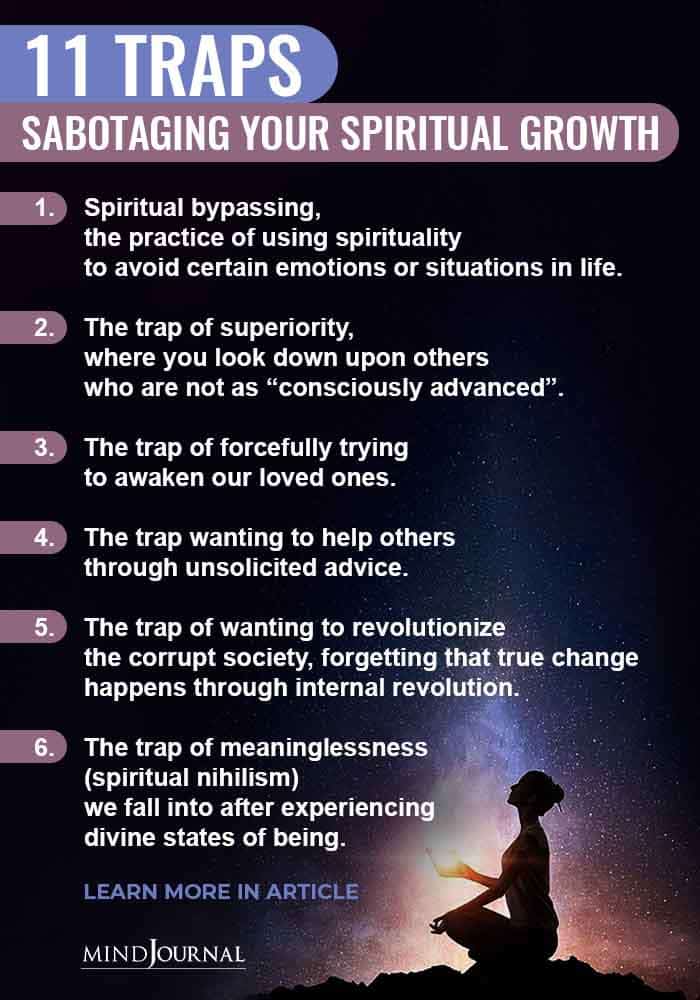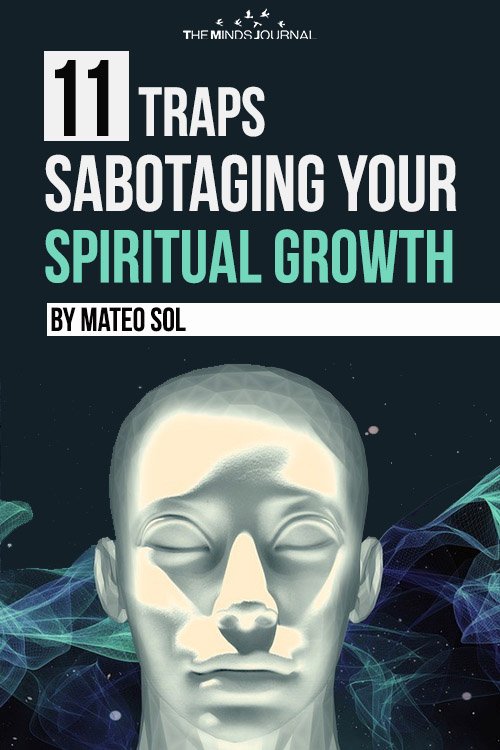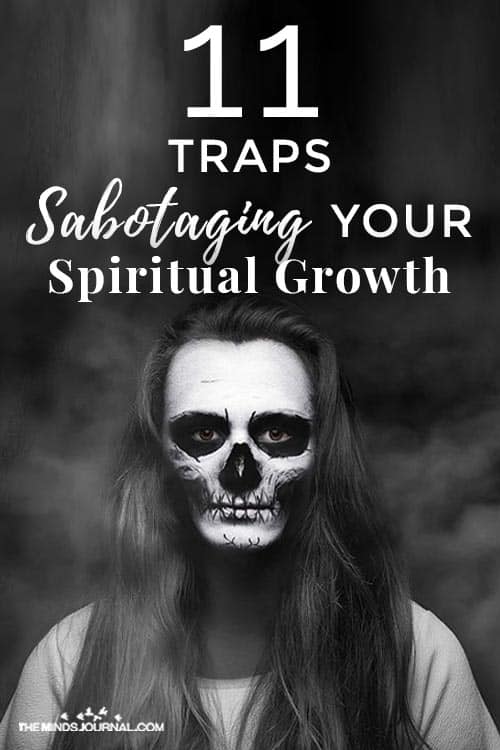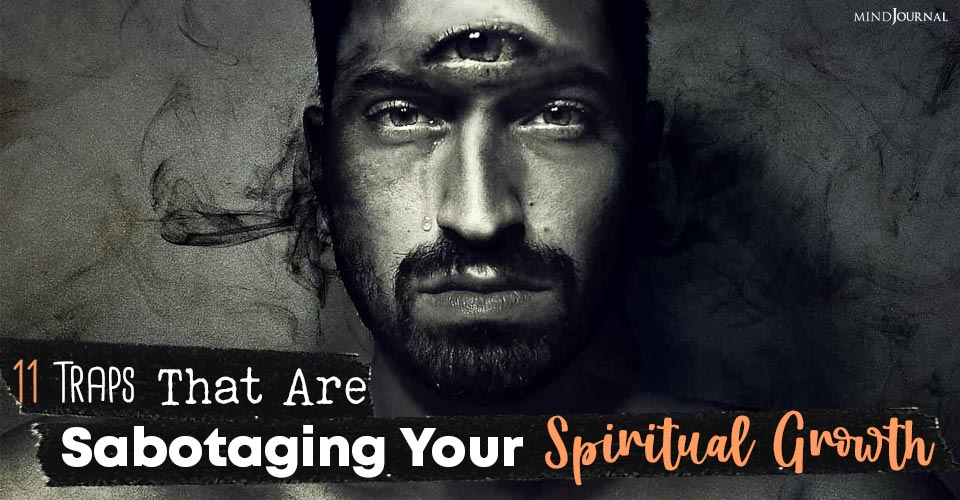When you’re on a spiritual journey, ever wondered about what is hindering your spiritual growth? There are some spiritual traps, take a look at what these are.
No matter what the practice or teaching, ego loves to wait in ambush to appropriate spirituality for its own survival and gain.
– Chögyam Trungpa
Spiritual growth is an experience we all go through once we have experienced the spiritual awakening process. As we begin to awaken to the truth of who we are, we develop a connection to our authentic essence, higher nature, or Soul.
As we progressively advance on our paths, our spiritual essence begins to blossom like a luminous flower deep in our hearts. And the more we clear away the dead, gnarled and overgrown beliefs, perspectives, and emotional baggage within us, the more clearly we feel our divine essence.
When we maintain our inner garden, we feel more and more love, wisdom, peace, and wholeness as our True Nature is revealed slowly to us.
Yet, like any garden, our metaphorical inner landscapes can be consumed by weeds, plagues, and forms of pollution that strangle anything beautiful we have been nurturing.
Sometimes, we even sabotage the growth occurring within us ourselves, without knowing it.
What is Spiritual Growth?
Spiritual growth is the process of awakening to your true nature, purpose, and potential. When you undergo spiritual growth you experience an expansion in awareness and insight, also known as higher consciousness.
All spiritual growth has one objective: to help you embody your Soul, Higher Self, or Atman. Once you are able to unite with your Soul, you will experience what is understood as enlightenment, “heaven,” Oneness, or moksha.

This isn’t a journey about becoming something. This is about unbecoming who we are not. – Adyashanti, The End of Your World
The problem with the spiritual journey is that it is often laden with traps of many kinds. These traps are not physical, but they are instead mental and are often referred to as anti awakening forces.
As we process life primarily through the mind, we also tend to approach spirituality with the mind. The issue with this is that spirituality cannot be contained by the limitations of thought.
Once spirituality is captured within a thought, it ceases to maintain its true essence and instead becomes a constricting belief or dogma. In other words, spirituality loses its alive, ever-flowing essence once it is compartmentalized within the mind.
Think about it this way: have you ever felt immense awe and wonder in the presence of something beautiful and enchanting like a sunrise?
The moment you stop immersing yourself in the feeling of the sunrise and start taking a photo of it or describing it in a text message is the moment you are no longer truly present with the sunrise.
Instead, you are filtering it through your thoughts or through a lens of some kind. The same can be said with spirituality.
The more we use the mind to approach our Soul, the further our Soul feels. But the moment we drop our thoughts and allow ourselves to purely feel our Soul, suddenly we feel at home once again.
Think of it like this: when you chase the sun on the horizon thinking you will reach it, you never will, because it is an illusion. But when you stop and feel the sun’s presence shining on your skin already, you will no longer chase anything.
It is difficult for us, as mind-oriented beings, to become conscious of our thoughts, as we have been conditioned to identify with them since a young age.
But once we can observe our thoughts and how they tend to sabotage our happiness, we will experience true spiritual growth.
Below I want to share with you eleven of the most common traps that we fall into on the spiritual path. I have personally experienced these pitfalls many times, and they have resulted in a lot of pain and struggle. See how many of these traps you can identify with:
11 Traps That Are Sabotaging Your Spiritual Growth
1. The trap of spiritual bypassing
Spiritual bypassing is the practice of using spirituality to avoid, suppress, or escape from certain emotions or situations in life. Common types of spiritual bypassing include:
- numbing one’s emotions through “spiritualized” repression and avoidance
- unhealthy obsession and attachment to the positive (e.g. positive thinking) and adopting a passive-aggressive “nice” mask
- debilitating judgment about one’s negativity or shadow self
- anger-phobia
- weak personal boundaries
- blind or excessively tolerant compassion (to the detriment of oneself and the other)
- forcefully trying to “kill” the ego and condemning it as “bad/evil”
exaggerated detachment - getting stuck in theoretical spirituality and dogmatic beliefs about “truth”
- denial of self-responsibility by placing it on another higher being (e.g. spirit guide, angel)
- delusions of having arrived at a higher level of being
- using spiritual practices to escape unpleasant emotions; for example, using meditation to dissociate from emotions, rather than transmute them
2. The trap of superiority
This manifests as the tendency to “look down” upon others who are not as “consciously advanced” or “awakened.” The trap of superiority can be seen as a subtle feeling of “being better” than others who aren’t “spiritual.”
In more extreme cases, this trap can appear as the tendency to lash out at people who are still “asleep,” “blind” or “sheep” of society. This kind of reactive behavior can often be seen in people who have just “woken up” to the state of the world, yet have undergone minimal spiritual growth.
We need to remember that everyone is doing the best they can at their level of consciousness. When the time comes, they will awaken too.
Read 7 Stages Of Awakening You Have To Go Through To Achieve Enlightenment
3. The trap of forcefully trying to wake others up
Once we have awoken out of the “matrix” it is common for us to desperately want our loved ones and fellow peers to awaken. We can see how much pain and delusion other people are in, and that riles up in us the intense desire to “show them the truth.”
However, often our attempt to forcefully awaken people misfires quickly. Even though we have good intentions, our desire to “save” others causes them to a backlash in ways that infuriate both them and us.
The less responsive they are to our pushy attempts to “wake them up,” the more frustrated and alienated we become.
Eventually, trying to force others to wake up ends up harming both ourselves and others. Not only that, but this trap generates a lot of anger and misunderstanding, which results in further ego ensnarement, sabotaging our spiritual growth. Let people wake up when they are ready.
4. The trap of wanting to help others
This trap is closely entwined with the previous trap except it is more geared towards giving others advice. There is nothing wrong with wanting to help others, as long as you respect their boundaries.
But sometimes developing an expanded spiritual perspective gives the ego an opportunity to feel more “knowledgeable” than others still trapped in the illusion. When unsolicited advice is given to others, the results can be disastrous (think anger, upset, offense, etc.).
Wanting to help others can also be used as a way of escaping our need to help ourselves. Under the guise of being “spiritual” and compassionate, helping others can be just another form of spiritual bypassing.
5. The trap of wanting to revolutionize the world
Once we wake up to the lies and corruption present in our current societal structure, many of us want to desperately change society.
We fall into the trap of thinking that freedom, honesty, and justice can be created by changing the external system. As a result, we buy into the “us versus them” and “divide and conquer” mentality that is a product of the ego’s tunnel vision.
We don’t realize that we’re actually fuelling the corrupt system which depends on anger and chaos to thrive and survive. Instead of understanding that all true change comes from an internal revolution, we get caught up in the pursuit of external revolution which is fragile and transient.
Related: 11 Major Warning Signs From the Universe
6. The trap of meaninglessness
Once we experience divine and transcendent states of being in which we become One with all, we can fall into the trap of spiritual nihilism after the experience passes.
In other words, once we realize, from the perspective of the Universe, that nothing we do ultimately matters because all is passing, we can fall into a depressive mindset. Using truths such as “All is an illusion,” the person who falls for this trap tends to filter life through the mind.
By mentally clinging to these truths, they become beliefs that the ego uses as an excuse to paradoxically feel separate from existence.
7. The trap of avoiding everyday responsibilities
Some people get so infatuated with the spiritual path that they avoid dealing with ordinary, everyday affairs. This form of escapism can lead to leeching off others, not paying bills, evading taxes, obsessing with “living off the grid,” etc.
When avoiding everyday responsibilities is worn as a badge of being consciously elevated or “more spiritual” this too is a form of egotism in disguise.
Avoiding ordinary responsibilities that are not perceived as being “spiritual enough” can also be a form of distraction that the ego uses to limit spiritual growth.
The more concerned and obsessed you are with living an outwardly “spiritual” looking life, the more distanced from your soul work you become. Sometimes we need to feed the sharks to keep calm and live balanced lives.
Remember the old Zen saying: “Before Enlightenment: chop wood, carry water; after Enlightenment: chop wood, carry water.” We need to be humble and recognize that ordinary daily life is the perfect place to spiritually grow and mature.
8. The trap of self-victimization
Soon after we experience a spiritual awakening and wake up to the insanity of the world, it is common for us to get stuck in self-victimization. We may start to perceive the world as a “prison” and other people as the “captives” or even “capturers.” The shock of awakening may send us spiraling into anxiety and paranoia.
Inevitably, we may start feeling like victims resulting in us blaming other people and the higher powers for how we feel. The spiritual trap of self-victimization can be seen a lot on social media which often tends to become a pity party for spiritual fledglings.
At the end of the day, we need to see that it is actually our thoughts that cause us to suffer, not other people or situations. Once we can take self-responsibility for our perspectives and beliefs, we can become empowered once again.
9. The trap of the Savior Complex
This trap is related to the previously mentioned trap of wanting to help others. The Savior Complex is adopted by people who feel a sense of superiority to the rest of humanity.
Their sense of being “different” and more “spiritually elevated” can make them feel as though they are destined to fix the world.
The Savior Complex can most often be seen within the “lightworker/Starseed/healer” circles who tend to put themselves upon pedestals, believing it is their cosmic duty to “save the planet.”
This perception aligns with the belief that there is something “wrong” with reality and that other people are “broken” and need to be fixed (which is an ego perspective). This perception also reinforces the ego’s sense of “specialness” and self-importance.
The Savior Complex can go one step further and evolve into a Martyr Complex. Martyrs believe they must “bear the burdens” of others. Obviously, this is an extremely unhealthy way of living which is based on Christian conditioning (think of the story of Jesus).
By “carrying” other people’s pain, Martyrs bypass taking responsibility for their own happiness and enable other people’s immature behavior. Read more about the Martyr Complex.
Related: The Dark Side of Spiritual Awakening
10. The trap of attachment
After experiencing profound and expansive mystical experiences that often come after significant spiritual growth, it is common for us to attach to the experience.
It can be painful to come down from these experiences and return back to usual, unenlightened reality. We can also attach to our “stories” and beliefs about spirituality.
Because the mind tries to make sense of this transcendent experience, it will often latch onto various ideas as a form of control. But the more we attach to our beliefs, stories, desires, and mental interpretations, the more we suffer.
We forget that everything passes, even transcendent experiences. Enlightenment isn’t a destination, it is a complete surrender; a fundamental shift in the way we approach life.
Attachment is perhaps the most common trap that sabotages our spiritual growth. On one hand, attachment to ideas helps us to grow, but ultimately, those ideas that we are unwilling to let go of end up stagnating our growth.
When ideas become protection blankets rather than catalysts for our growth, there is a big problem. We need to realize that freedom cannot be experienced through the mind. Freedom is felt when we can be liberated from attachment to our thoughts.
11. The trap of relying on external answers
As we progress through our spiritual paths it is normal, and beneficial, for us to seek out external support. Reading books, attending workshops and seminars, going to retreats, practicing holistic techniques, and getting a personal guru all to help us experience spiritual growth.
However, after a while, it is common for us to become too dependent on external answers for our freedom and happiness. This pitfall can be seen in many spiritual seeker’s obsession and glorification of their gurus (in other words, projecting and disowning their divinity onto another).
Eventually, as we become accustomed to constantly searching outside of ourselves for answers, we forget the presence of our own Souls.
We forget that our ultimate source of guidance and wisdom comes from within us, and instead, we keep chasing things outside of ourselves that we believe will “enlighten” us.
We need to stop, pause, and reflect on our spiritual journeys. Are we seeking out first-hand experience or second-hand experience given to us by others? Don’t forget to look within for your answers as well because it is by connecting with your Soul that you will ultimately experience freedom.
In order to see through and extricate ourselves from these traps, we need to be radically honest with ourselves. We need to be willing to see that we have indeed gone astray and have fed into the ego. We will also immensely benefit from exploring our Shadow Selves and exploring our mistaken beliefs.
Don’t worry if you have fallen into any of these traps. We all become ensnared by the ego. It can be particularly difficult for us to see clearly when the ego “spiritualizes” certain beliefs and ideas.
The more open, humble, and honest you are, the more you will be able to see through these tricks and liberate yourself.
Finally, don’t be afraid of the dark. Don’t be afraid of being wrong. Everything, no matter how painful, is a learning opportunity. At the end of the day, your Soul is everything you have been searching for.
If you have any extra thoughts or insights about traps that sabotage spiritual growth, please share below. I would also love to hear about your own journey.
Related: 14 Unique Symptoms Of A Spiritual Awakening
If you realize that these traps are sabotaging and interfering with your spiritual growth, then you need to let go of all the negativity that is blocking the freedom and peace of your mind.
If you want to know more about the traps that choke out your spiritual growth, then check this video out below:
Written by Mateo Sol
Originally appeared on Lonerwolf.com













Leave a Reply